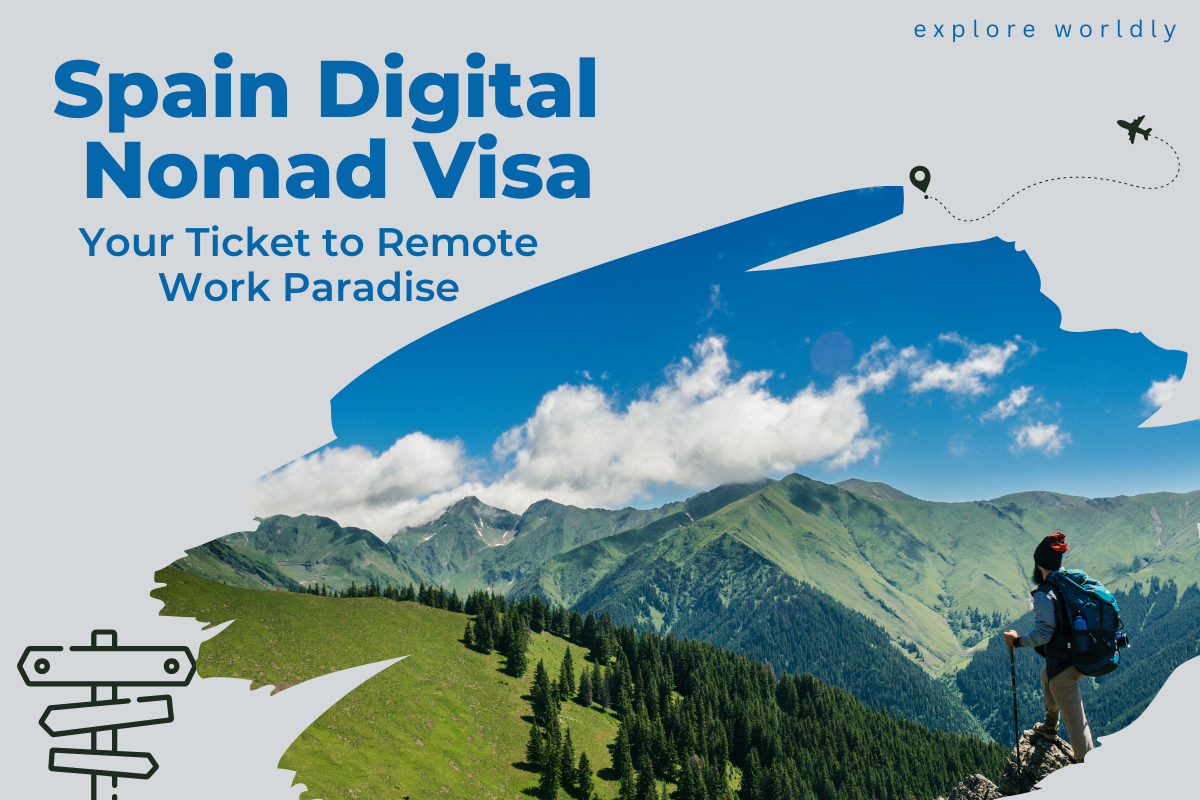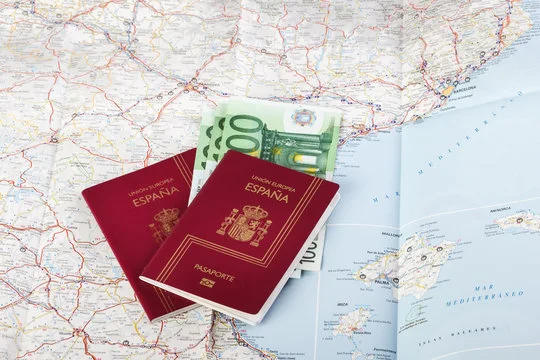Spain Digital Nomad Visa | Your Ticket to Remote Work Paradise

The rise of digital nomadism has seen a big increase. It has led to more people working remotely from many locations around the world.
In the USA, there are currently 16.9 million people who are digital nomads. 72 million people are planning to become digital nomads soon. The pandemic sped up this trend, making remote work more popular in the UK and elsewhere.
What is the Spain Digital Nomad Visa?
The Spain Digital Nomad Visa allows foreigners to live in Spain as residents. They can work remotely for a company outside of Spain. This visa is for people who want to work remotely and experience life in Spain.
This blog post aims to give an overview of digital nomadism. It will introduce the Spain Digital Nomad Visa for remote workers. It will also discuss the benefits and challenges of the digital nomad lifestyle.
Eligibility criteria
To be eligible, you must be a non-EU/EEA citizen. You must have a university degree or three years of professional experience.
You must also show you have at least 200% of the Spanish national minimum wage (about £2140/month).
Comparison with other similar visas in different countries
The Spain Digital Nomad Visa is like other remote work visas. Portugal, Croatia, and Estonia also offer them. They also offer extended stays for non-EU/EEA citizens working remotely.
But, the specific requirements, benefits, and application process may vary between countries.

What Are the Visa requirements for Spanish citizens?
The visa requirements for Spanish citizens are explained in the following section:
What Documents Do I Need to Provide?
General Required Documents (For All Applicants):
Additional Documents for Family Applications:
If you are applying with your family (spouse and/or dependent children), you will need to provide more documents. You will need to provide them for each family member.
RELATED:
How Do I Apply for a Spain Digital Nomad Visa?
There are two main ways to apply for a Spanish Digital Nomad Visa:
1. Applying Abroad (From Your Home Country):
This is the most common approach for most applicants. Here’s a general overview of the process:
2. Applying in Spain (After Entering as a Tourist):
While less common, it is possible to apply for the Digital Nomad Visa after entering Spain on a tourist visa. Here’s a brief explanation:
What Is the Validity Period of the Digital Nomad Visa?
The Spanish Digital Nomad Visa allows for a one-year stay. You can extend it for up to five years with a residence permit.
This means digital nomads can live and work in Spain for a long time. They can experience its culture and lifestyle while pursuing their work.
What Restrictions Are There With a Spain Digital Nomad Visa?
Here are some of the key restrictions associated with the Spanish Digital Nomad Visa:
What’s the Difference Between the Spain Digital Nomad Visa and Non-lucrative Visa?
The Spanish Digital Nomad Visa and the Non-Lucrative Visa differ. It’s about whether you want to work remotely.
| Feature | Digital Nomad Visa | Non-Lucrative Visa |
|---|---|---|
| Work Permission | Remote work for companies/clients outside Spain (up to 20% from Spain) | Not allowed to work in Spain |
| Minimum Income Requirement | €2,160 per month (individual) | €2,400 per month (individual) (2023) |
| Initial Visa Validity | One year | One or two years |
| Potential Residency | Up to five years | No clear path to permanent residency |
| Purpose | Remote workers with established income | Living in Spain without working |
Legal and Tax Considerations
Digital nomads in Spain face specific tax rules. These rules include a 24% tax rate for income up to €600,000. Income above €600,000 faces a 47% tax rate.
The Digital Nomad Visa has tax benefits. It includes a lower non-resident income tax for employees. Self-employed people pay a flat tax rate.
Legal rights and responsibilities of digital nomads under this visa
Digital nomads under the Spanish Digital Nomad Visa have legal rights and duties. These include the need to work remotely and have a job with a company for at least three months. They also must show proof of health insurance for at least one year.
They must also show they have the money to support themselves and any dependents. And they must meet the visa’s specific requirements. These include having a bachelor’s or master’s degree or at least three years of relevant work experience.
Insurance requirements and healthcare access
Digital nomads in Spain have to meet insurance requirements. They must have a health insurance policy for at least one year. The policy must be authorized to operate in Spain.
You can access healthcare through the Spanish public system. It is funded by taxes and provides free or low-cost services to residents. Private insurance policies are also available for additional coverage.
Do I Still Need to Pay Taxes as a Digital Nomad in Spain?
Whether you need to pay taxes in Spain as a Digital Nomad depends on your tax residency status.
- Spanish Tax Resident: If you spend more than 183 days in Spain in a year, you are a Spanish tax resident. This means you would be liable to pay taxes on your worldwide income in Spain.
- Non-Resident: If you spend under 183 days in Spain, you might be a non-resident for tax purposes. However, there are some additional considerations, like your center of economic interest.
Spain Permanent Residency Visa
The Spain Permanent Residency Visa is also known as the Tarjeta Comunitaria Permanente. It lets people live and work in Spain indefinitely. But, they must have lived in the country legally for five years. Here is how you can apply for it:
Application Process
- Submit your application for Permanent Residence at least three months before your visa or permission expires.
- Provide various documents. These include a completed form and proof of current residency (e.g., a work or rental contract). Also, evidence of living in Spain for five years, a police registration, proof of ongoing residency, income or savings, and a health insurance certificate for Spain.
Renewal Process
- Once approved, you will receive a residency card that is valid for five years. It is crucial to renew this card before it expires to maintain your immigration status in Spain.
- To renew, submit the right form and documents. These include proof of address in Spain, the original residency card, passport, and the renewal fee. You may also need to resubmit your fingerprints.
Cost and Requirements
- The cost of applying for Permanent Residency in Spain is around 80 euros, but this can vary based on individual circumstances.
- Requirements include having clean criminal records. You must also show financial stability and continuous residence in Spain for five years. You must also provide necessary documentation, such as passports and medical certificates.
Benefits:
Digital Nomad Destinations in Spain

Spain has digital nomad destinations. They include Barcelona, Valencia, Madrid, Malaga, and Palma de Mallorca. Each city offers unique advantages for digital nomads, such as:
When choosing a digital nomad destination in Spain, consider factors such as cost of living. Also, think about internet speed, cultural attractions, and the availability of coworking spaces.
Each city offers a unique blend of these factors. They let digital nomads find the perfect balance between work and play.
Summary
In summary, the Spain Digital Nomad Visa offers a rare chance for remote workers and freelancers. It lets them live and work in Spain. Spain is known for its rich culture and diverse landscapes. This visa stands out among EU counterparts.
It has benefits like lower tax rates, family sponsorship, and a path to permanent residency. Digital nomads should consider Spain. They should explore more resources. Or, they can seek help. This will make their transition into the digital nomad lifestyle there smoother.
FAQs –
What is the minimum income for digital nomad visa Spain?
The minimum income requirement for a Spain Digital Nomad Visa for Individual: €2,646 per month
Couple: €2,646 + €993 (75% of minimum wage) per additional person = €3,639 per month
Family with Child: €2,646 + €331 (25% of minimum wage) per child = €2,977 per month (additional children add another €331 each)
Is there tax on nomad visa in Spain?
Yes, there’s tax with Spain’s Digital Nomad Visa, but at a flat 24% on Spanish income (up to €600,000) which can be lower than resident rates.
What are the benefits of a digital nomad visa?
Digital nomad visas offer legal work stays, tax perks, access to local services, and the chance to build expat communities. All while enjoying a flexible work-from-anywhere lifestyle.
Does nomad visa lead to citizenship?
No, a digital nomad visa itself typically does not directly lead to citizenship. It’s a visa for temporary stays focused on remote work.
However, some countries with digital nomad visas also offer paths to permanent residency or even citizenship after meeting specific requirements and residing in the country for a set period.
Can you bring a spouse on a digital nomad visa?
Yes, you can often bring your spouse on a digital nomad visa (Spain included) with a dependent visa allowing them to live with you, but usually not work locally.
